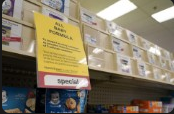
EXCLUSIVE — President Joe Biden’s Federal Trade Commission is being sued for allegedly blocking the release of records related to its investigation of the nationwide baby formula shortage.
The Functional Government Initiative, an ethics watchdog , sent a Freedom of Information Act request in August to the FTC for the records, noting their release is in the “public interest.” But the watchdog has not received any records as of this writing and is now suing the FTC for “wrongfully withholding them,” according to a Wednesday complaint obtained by the Washington Examiner.
“FGI anticipates that officials and staff at FTC discussed and participated in making and implementing decisions about the investigation into the infant formula crisis,” read the watchdog’s lawsuit. “The public does not have an ability to easily evaluate the decision-making surrounding FTC’s investigation.”
THE BABY FORMULA SHORTAGE ISN’T OVER
As a result of the global supply chain crisis that has coincided with the COVID-19 pandemic, the United States has experienced a significant shortage in infant formula. The shortage was worsened in February 2022 when major manufacturer Abbott Labs shut down its Sturgis, Michigan, plant after the Food and Drug Administration found bacteria there that led to two infants dying.
It was revealed in April that a whistleblower and former Abbott employee sent a 34-page complaint to the FDA in October 2021 warning of the plant’s problems. That complaint was lost in the FDA’s mailroom for four months until the FDA reviewed it, the agency said in May.
The FTC initiated an investigation on May 24 into the formula shortage “to identify the factors that contributed to the shortage or hampered our ability to respond to it,” the agency’s Chairwoman Lina Khan said at the time. The agency noted it was seeking public comment “on whether the FTC itself or state or federal agencies may have inadvertently taken steps that contributed to fragile supply chains in the market for these crucial products for many American families.”
Through its lawsuit, FGI aims to obtain records on this announcement and communications between FTC commissioners or their staff with members of Congress and congressional staff about infant formula.
The watchdog also wants records showing FTC commissioners perhaps communicating with outside groups about the investigation and any “analysis or discussion” conducted by FTC commissioners on comments submitted about infant formula.
“FTC’s investigation into the causes of the infant formula crises is especially significant given that the Nation continues to confront shortages in the supply of infant formula that threatens the well-being of some of the country’s most vulnerable individuals,” the lawsuit read.
On Sept. 7, the FTC told the watchdog in a letter it would be unable to comply with its FOIA request within the 20-day period required under the law. The agency granted itself an extension due to the “unusual circumstances” that arose from the “need to search for and collect the requested records from field facilities or other establishments that are separate from the office processing the request.”
But the FTC did not list a date for when it would fulfill the FOIA request, says the watchdog, nor did the agency say in what location or field facilities it was searching for the records.
“Americans deserve to know what this investigation is doing to get baby formula back on the shelves and how it can help prevent future shortages,” FGI spokesman Pete McGinnis told the Washington Examiner.
At the moment, powdered infant formula has a shelf stock rate of 87%, according to data released Wednesday by the analytics and research firm IRI Worldwide. There was a shelf stock rate of between 88% and 90% in February 2021, prior to the start of the crisis, and a 69% rate this summer when roughly one-third of formula was out of stock.
However, the Census Bureau’s Household Pulse Survey released Wednesday found roughly 30% of families with babies under 1 year old had a difficult time finding formula at the end of September.
The FTC did not respond to a request for comment.
* Article from: The Washington Examiner


